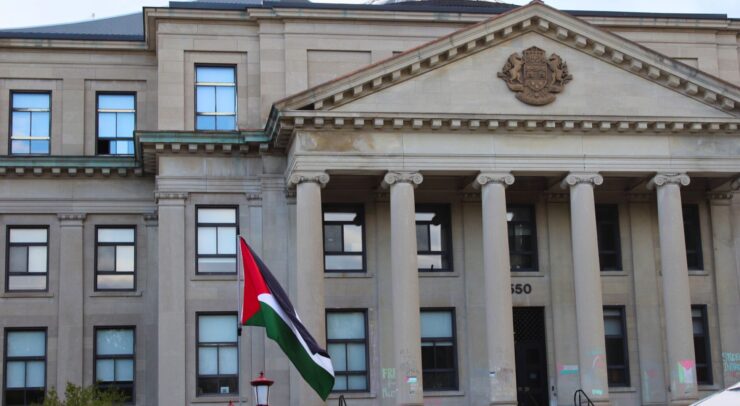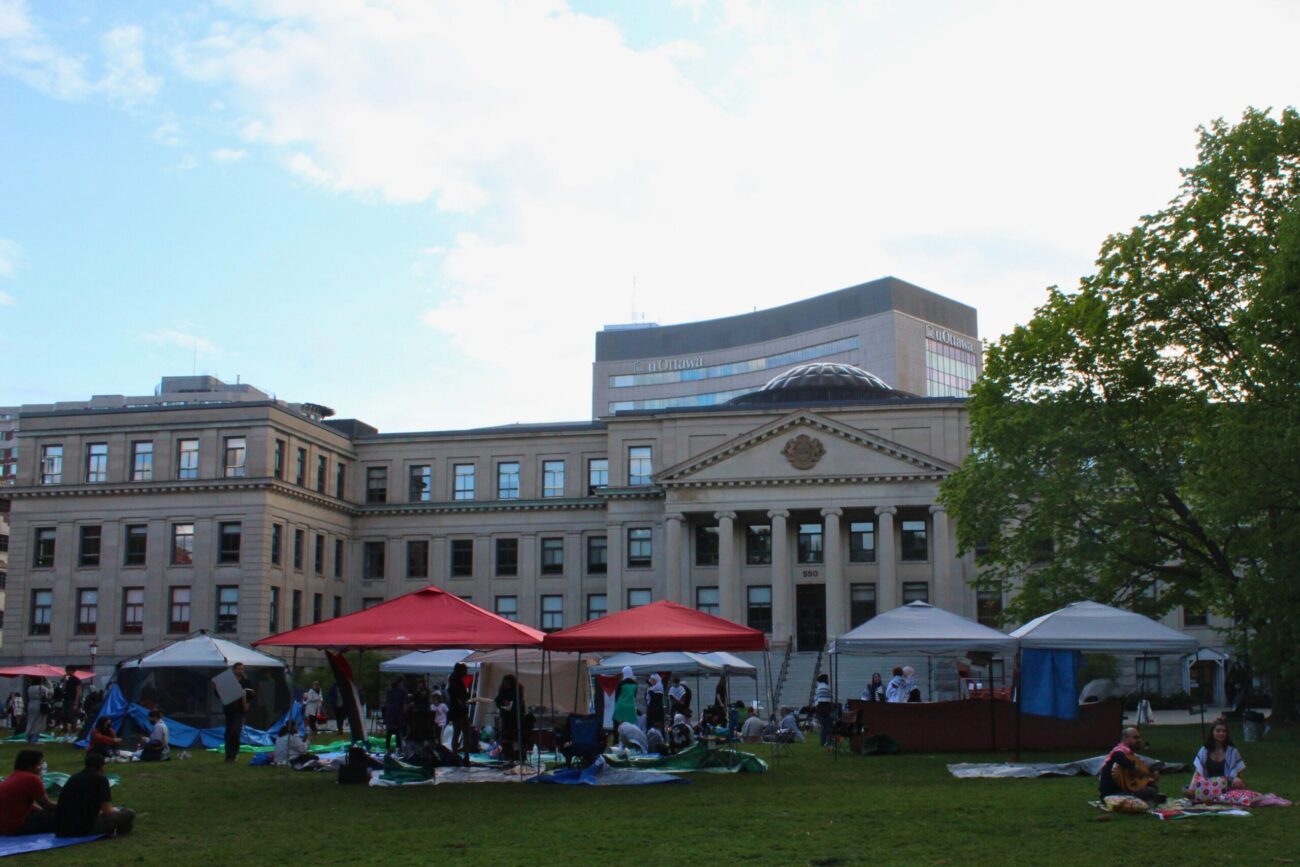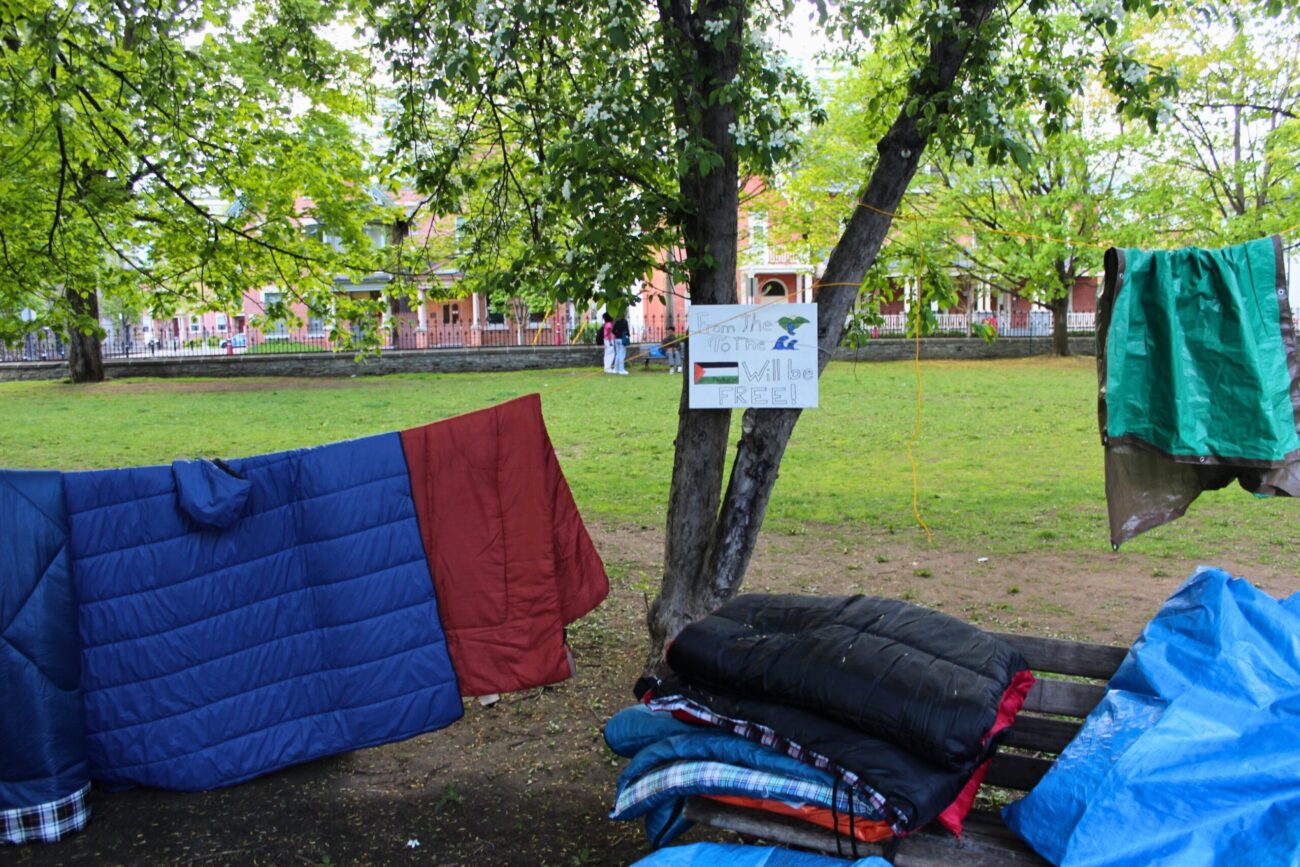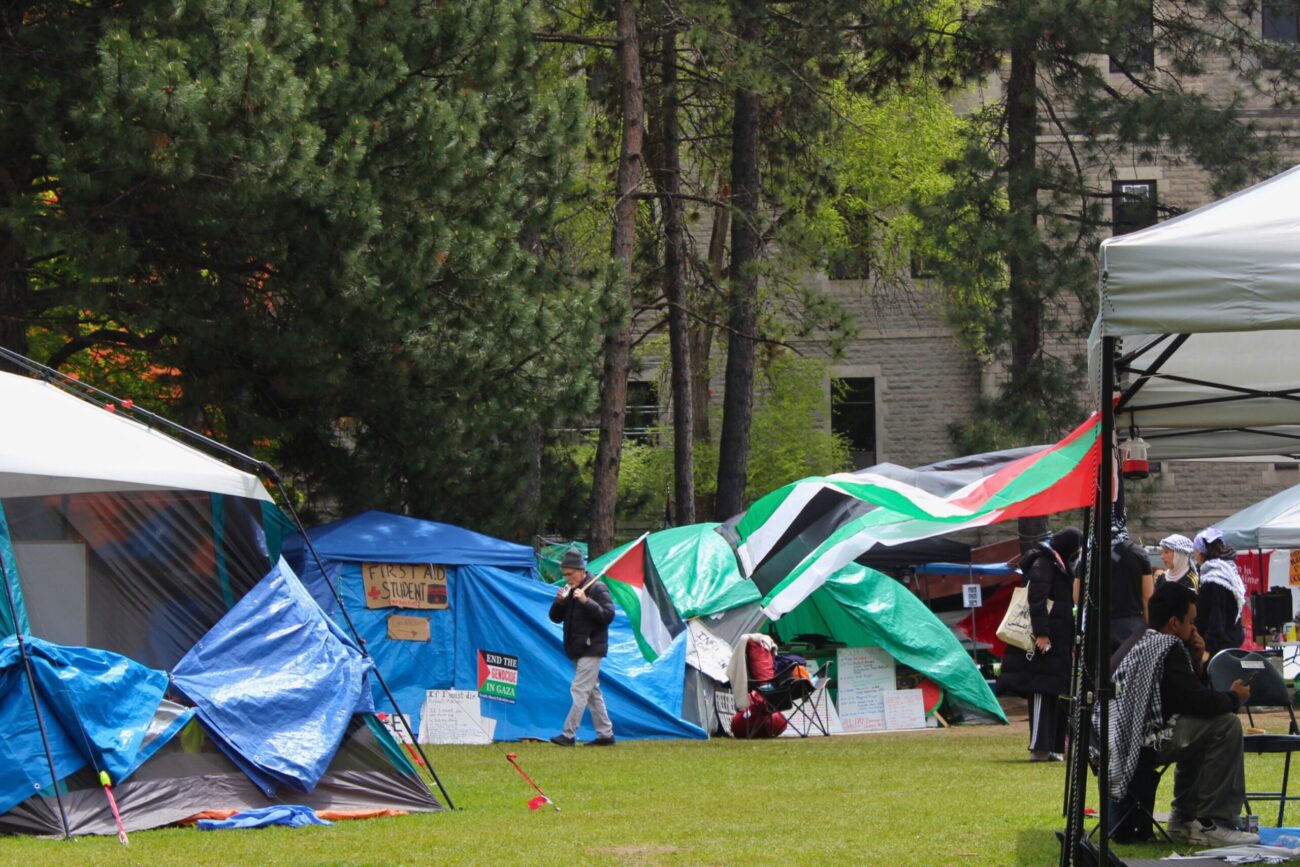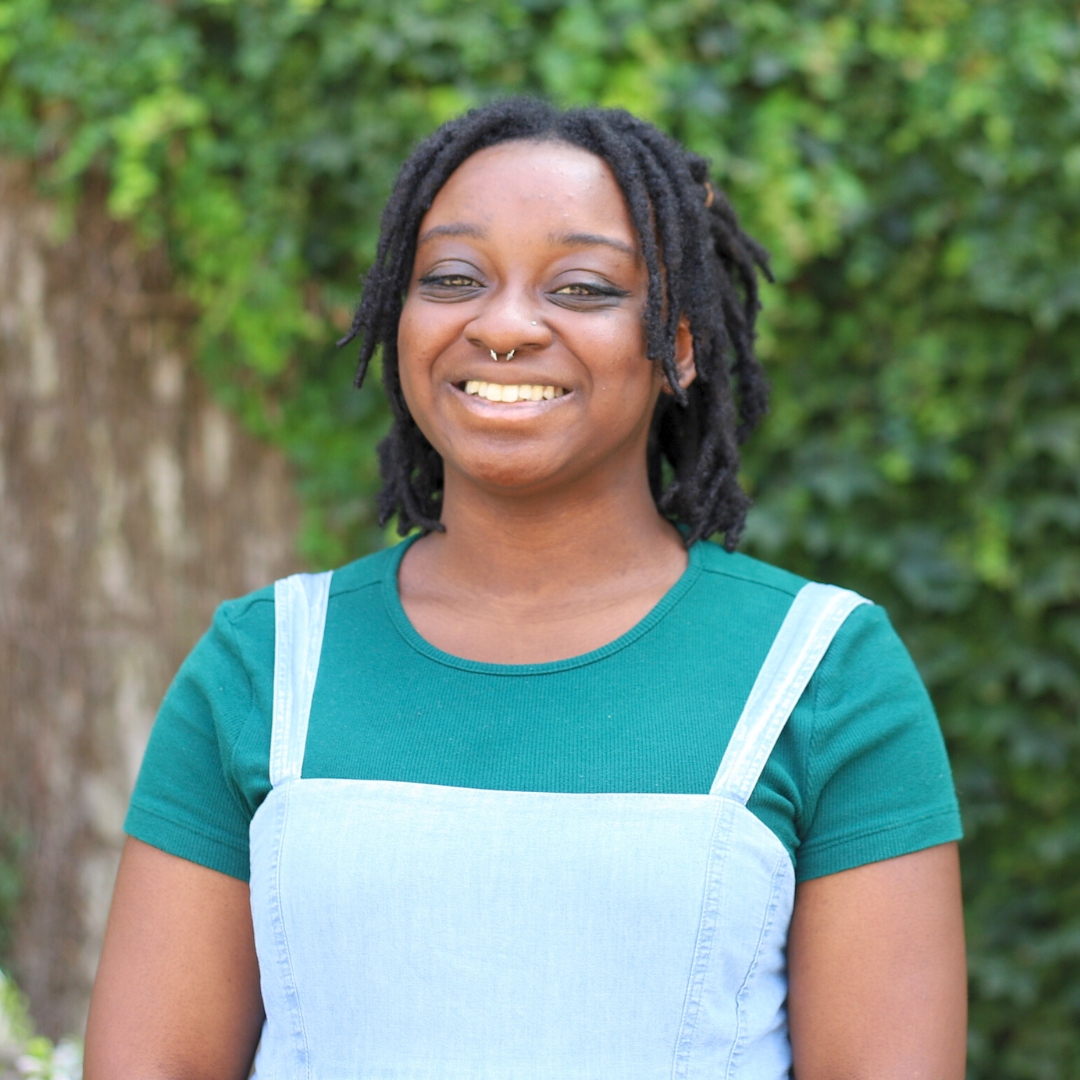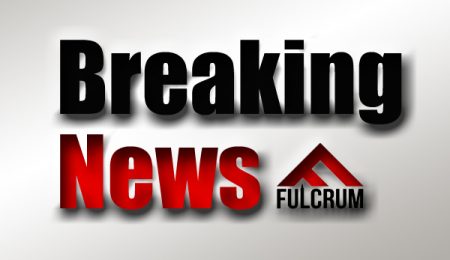Rain or shine, calls for divestment thunder on
The student encampment at the University of Ottawa has entered its second week on Tabaret Lawn, demanding the university to divest and disclose its investments in Israeli businesses and institutional relationships. Co-organized by INSAF uOttawa and the Palestinian Students Association (PSA), the encampment has grown in numbers and community support.
Across the country, more university encampments have appeared, including at Queen’s University and McMaster University. Police forces have violently shut down student encampments at the University of Calgary and the University of Alberta, the former within 24 hours of their erections.
As of May 12, INSAF and the PSA are scheduled to have an informal meeting on Monday, May 13 with both U of O Board of Governors secretary-general, Annick Bergeon, and chief investment officer, Francois Dionne, before meeting again Wednesday, May 15 at 2 p.m.
Day Eight: Monday, May 6
Following the weekend demonstrations at Tabaret Lawn, internal meetings and town halls were held throughout Monday for encampment members and protesters to hear feedback and address sustainability concerns. Such internal meetings included food committee members navigating sanitation and compost, while broader town halls discussed police training and marshalling.
On the same day, an emergency rally was organized by the Palestinian Youth Movement (PYM) for later that afternoon at the Human Rights Monument. The purpose of the rally was to bring attention to Rafah, a southern city in the Gaza Strip where over a million Palestinians are seeking refuge — and where Israel announced an airstrike campaign would begin.
Rally protesters arrived at Tabaret Lawn at around 5:30 p.m., speaking in solidarity with the encampment demonstrators; they urged both the U of O to listen to the students’ demands to divest and called upon the Canadian government to issue an arms embargo on Israel.
Day Nine: Tuesday, May 7
Organizers INSAF uOttawa and PSA met with Awad Ebrahim, vice-provost of Equity Diversity and Inclusive Excellence, and Éric Bercier, associate vice-president of Student Affairs to hear the university’s demands. These demands, which were listed in an email sent to organizers the day prior, included no hate symbols, environmental considerations, and reducing the area of the encampment to 50 per cent of the Lawn “to minimize disruptions to campus activities.”
INSAF and PSA told the Fulcrum that university administrators promised INSAF a meeting with Annick Bergeon, secretary-general of the U of O’s Board of Governors, about disclosure and divestment, on the condition that the encampment area was reduced. Ebrahim and Bercier also urged the organizers to keep the details of the meeting private; organizers refused these conditions and instead, held a site-wide speech that evening.
Faculty 4 Palestine Ottawa sent a letter of solidarity to organizers. Identifying themselves as faculty members, librarians and staff at the U of O, Saint-Paul University and Carleton University, the organization stated they, “support the rights of students to peacefully protest in solidarity with Palestine.”
The letter also urged the university administration to meet with student leaders and discuss their demands of disclosure and divestment, as well as acknowledging the scholasticide in Gaza. “While we write from our universities, there are no universities left standing in Gaza, all destroyed by Israel. Hundreds of our Palestinian colleagues have been killed or maimed by the Israeli army.”
Currently, there are over 200 signatories on the letter from the three Ottawa universities, including over 100 being faculty members and staff from the U of O.
Organizers of the demonstration were additionally visited by a representative from the Museum of Natural History, asking for artwork donations after the encampment is disbanded.
Day Ten: Wednesday, May 8
Encampment demonstrators discussed statements published by two U of O political student clubs; the uOttawa Conservatives and Ontario Young Progressive Conservatives’ “Urgent Call to End the Encampment on the University of Ottawa”, and the Ontario New Democratic Youth’s “Statement of Solidarity with Campus Protests”.
Attendees heard a speech from Beth Dollaga, secretary general of the International Coalition of Human Rights in the Philippines, who spoke about the similarities between the struggles of Indigenous and Muslim Filipinos’ liberation with the freedom of Palestinians.
The arts committee, a group of attendees managing paint supplies and art projects, unveiled “The People’s Journal.” The journal is a space for attendees to note down their perspectives, reflections, and reactions while being at the sit-in/encampment.
Dr. Yipeng Ge, a former medical resident at the U of O who was suspended for pro-Palestinian posts in October, also led a speech before the evening town hall. Ge discussed his experience as a physician on a medical trip to Gaza in February, witnessing malnutrition and starvation.
“There, however, remains an inability — an unwillingness — by the majority of medical, healthcare, and public health professionals and organizations to call out an ongoing genocide by Israel, and the root causes of death and disease being colonialism, manifesting as the ongoing Nakba in Palestine,” said Dr. Ge.
Day Eleven: Thursday, May 9
May 9 marked the first day of turbulent weather in the city, and the encampment, with volunteers setting up tent frames to expand the encampment and protect against unpredictable rain.
An interactive teach-in about Palestinian political prisoners was hosted by the PYM, and was supported by Dr. Nahla Abdo, a full professor at Carleton University. Together, attendees and hosts defined terms and learnt something new. For example, administrative detention “is used to detain Palestinians and the courts can rule to extend this detention every six months.”
PYM also discussed the historical backgrounds of the Palestinian People’s Movement, the First Intifada, and the Oslo Accords.
Concurrently, several universities in the United States — such as Sacramento State University and Evergreen State College have committed to protester demands of divestment and severing ties with Israeli institutions.
In Alberta, police officers confronted protesters at the University of Calgary, who had begun an encampment on campus at 5 a.m. that morning and disbanded around 12 a.m. later that day. Police officers used shields, tear gas and flash-bangs against the student crowd. Five arrests were made as well.
Day Twelve: Friday, May 10
At the beginning of the day, Canadians for Justice and Peace in the Middle East (CJPME) published an open email campaign for supporters to pressure the U of O administration to “respect the student demands and divest from investments in Israel”.
Since the beginning of the week, the amount of tents within the enclosed encampment space has expanded to around 50; the chalk drawings have also grown. The university had demanded the organizers to reduce space on Tabaret Lawn and clear chalk drawings.
High school students from the city joined attendees in the afternoon to support the demonstration. By the early evening, the lawn was filled with students and families alike, bringing the attendance number to over 100 people.
Iyas Salim, an adjunct professor in international studies at Carleton University, recounted the life of his late brother-in-law, Ahmed —a 17-year-old high school student — who was killed by Israeli Defensive Forces (IDF) shelling in March.
Following Salim, a teach-in, “Min el Mayye lal Mayye” was led by Dr. Nahla Abdo, a professor at Carleton University who studies settler-colonialism and decolonization. She discussed the brief history of Palestine, defined Zionism with participants, and discussed the impacts of Western imperialism on Palestinians.
A Shabbat candle vigil was held by Independent Jewish Voices (IJV) Carleton at sunset. “During this time — these past seven months especially — we’re all here with a common purpose, which is total liberation for Palestinians,” said Amelia Blazer, the vice president internal for IJV Carleton.
Day Thirteen: Saturday, May 11
Campus demonstrators were accompanied by protesters, who began at the Human Rights Monument, to support the encampment calling on the U of O for disclosure and divestment from corporations with direct ties to the Israeli government. At its peak in the late afternoon, over 300 people gathered at Tabaret Lawn.
A speaker wearing a blue graduation cap and gown addressed the crowd, highlighting the destruction of Palestinian universities and the collapse of the entire education system in Gaza. “The class of 2024 is zero — no one is graduating.”
The children choir of the Jerusalem Community Services of Ontario (JSCO) performed for the protesters as well.
Across the country, Edmonton police forces violently dismantled a student encampment at the University of Alberta, with social media footage showing police officers using batons and arresting protestors. The dismantlement comes two days after police forces violently took down an encampment at the University of Calgary.
The Canadian Association of University Teachers have started a boycott and called for a censure of the two Alberta universities. The boycott includes not accepting appointments or speaking appearances at the schools. Over 1400 professors have signed the petition so far.
You can read all of the Fulcrum’s coverage of the encampment here.
- With files from Kavi Vidya Achar, Andrew Wilimek, Bridget Coady and Daniel Jones
- BREAKING: U of O students plan sit-in for Palestine
- U of O administration responds to sit-in plans
- Student Sit-In Begins April 29th on Tabaret Lawn
- Disclosure and Divestment: A look at U of O protesters’ demands
- BREAKING: Student Sit-In turns into active encampment
- Student Sit-In Continues on Tabaret Lawn for a Second Day; Turns Into Encampment
- ‘A simple meeting is the first step’: reviewing Day 3 of U of O’s student encampment
- “Divest is the neutral position”: Recapping Day 4 of U of O’s student encampment
- “Look away like you do for genocide”: Student Encampment Continues for Fifth Day
- ‘It’s important to … remember that we’re not in this alone’: reviewing day 6 of the U of O encampment
- U of O protest continues into second week: Day 8 recap
- Negotiations with University Break Down: Day 9 recap
- Political and Social Groups Respond: Reviewing Day 10 of the U of O protest
- Tent shelters, teach-ins continue at protest: Day 11 recap
- ‘Academia should be concerned with people’: recapping the 12th day of the U of O encampment
- Second Saturday of protest marked by community presence, rain: Day 13 recap
- Week Two Recap: Encampment, community support grows as organizers set to meet with university administration
- U of O protest organizers hold preliminary meeting with university administration: Day 15 recap
- Tensions high at Ottawa City Hall as Israeli flag flies: Day 16 recap
- University agrees to give timeline for disclosure of investments: Day 17 recap
- U of O offers timeline for disclosure; protesters interrupt Congrès de l’Acfas meetings: Day 18/19 recap
- Community rally walks through campus as protest continues for 20th day
- Progress on demands or administrative performativity? Week 3 Recap of the U of O encampment
- U of O encampment remains for fourth week as others in province end
- BREAKING: U of O submits first proposal to student protesters
- ‘Canada, you’re complicit in the genocide of Palestinians’: community protests at CANSEC, police station, and Parliament Hill
- INSAF, PSA provide negotiations update ahead of U of O disclosure
- University of Ottawa sends second proposal to encampment organizers
- U of O threatens to issue trespass notice to encampment
- BREAKING: University of Ottawa encampment erects barricades outside Tabaret Hall
- BREAKING: U of O encampment for Palestine ends after 71 days

